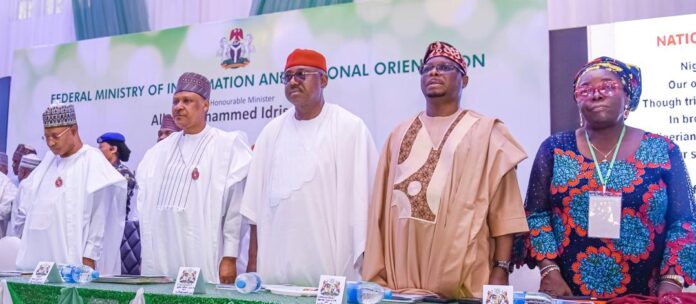L-R: Kaduna State Governor, Senator Uba Sani; Minister of Information and National Orientation, Mohammed Idris; Chairman, Senate Committee on Information and National Orientation, Senator Kenneth Eze; Chairman House Committee on Information, National Orientation, Ethics, and Values, Hon. Olusola Steve Fatoba and the Director overseeing the office of the Permanent Secretary, Federal Ministry of Information and National Orientation, Mrs. Comfort Ajiboye at the 48th National Council of Information and National Orientation in Kaduna on Friday (pic: FMINO)
Minister of Information and National Orientation, Mohammed Idris, has appealed to some state governments considering the dissolution or downgrading of their Ministries of Information to reconsider the decision, stressing that the ministries are not just administrative bodies but key drivers of public engagement, national orientation, and societal cohesion.
Idris stated this in Kaduna on Friday in his address at the 48th National Council of Information and National Orientation with the theme “Enhancing Public Information Management for Inclusive Governance: The Renewed Hope Agenda in Focus,”
“At this juncture, I would want to make a passionate appeal to some of our state governments, especially on the status and operations of State Ministries of Information.
“And my plea, for emphasis, goes like this: that, in the ever-broadening parameters of governance, the role of Ministries of Information at both the national and state levels cannot be overstated. These Ministries serve as the bridge between government policies and the citizens they are designed to benefit, thereby fostering transparency, accountability, and trust, which are essential pillars of any thriving democracy.
“The Ministry of Information plays a critical role in public sensitization. Through this institution, and the platforms associated with it, governments are able to educate citizens on policies, programmes, and initiatives. They also serve as vital platforms for addressing misinformation, which, if left unchecked, can erode public trust and undermine collective progress. In an era where information is both a tool and a weapon, having a dedicated body to manage its dissemination is indispensable,” he said.
Speaking on the theme of the Council, the Minister said the Renewed Hope Agenda of President Tinubu, is a clarion call for transformational leadership at all levels and people-oriented governance, which is firmly anchored on the time-honoured principle that governance must be inclusive, transparent, and centered on improving the lives of Nigerians.
Idris said the essence of governance lies in its ability to connect, communicate, and inspire collective action, hence information management is not merely a tool of administration but the lifeblood of democracy and development.
He said with a multiplicity of ethnic groups, languages, and religions in Nigeria, ensuring that every citizen feels heard, informed, and included in the governance process, requires deliberate efforts, especially by Information Managers.
The Minister advised that to foster inclusion in policy formulation, information managers should leverage technology to enhance the speed, accuracy, and reach of their messaging while also integrating artificial intelligence for better audience engagement and feedback analysis.
He equally said gendering Public Debate for policy refinement and alignment with public aspirations is a necessary component of promoting public participation in the decision-making process.
“In every democracy, the strength of governance is deeply rooted in its ability to reflect the will and aspirations of the people. Public policies, while crafted with the best intentions, must continuously evolve to meet the dynamic needs and expectations of the citizens they serve. It is within this context that public debate plays a pivotal role.
“For instance, you are all aware that we are currently witnessing robust debates on the Tax Reforms proposed by President Tinubu. Such debates are necessary in policy formulation and implementation in order to foster a transparent exchange of ideas, where citizens, civil society organizations, and other stakeholders can voice their opinions, and provide constructive feedback on the reform proposal of the President,” he said.
The Minister added that countering Misinformation and Fake News remains critical in information management, emphasizing that fake news poses a significant threat to governance and public trust.
He called for the provision of the necessary skills for information officers to employ fact-checking mechanisms, as well as seek collaboration with media organizations, and enhance public awareness campaigns to combat misinformation.
In addition to that, he said, President Tinubu recently approved the release of funds for the immediate operationalization of the UNESCO Category-2 Media and Information Literacy (MIL) Institute, the first of its kind in the world, and embedded in the precincts of the National Open University of Nigeria (NOUN) in Abuja, to equip people with the tools to discern between credible sources and misinformation.
“In an era where fake news, propaganda, and biased reporting can significantly influence public opinion and decision-making, media literacy fosters critical thinking. It helps individuals analyze the intent behind media messages, understand the context in which they are presented, and assess their accuracy and relevance.
“I will therefore urge the Commissioners for Information to take advantage of this very important Institute once it takes off, in order to further build the capacity of our staff in combating the menace of fake news, misinformation, and disinformation,” he said.
The 48th National Council of Information and National Orientation was declared open by the Kaduna State Governor, Senator Uba Sani.




